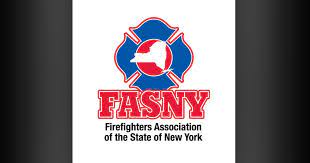March 21, 2023 Officials with the Firefighters Association of the State of New York say volunteers do much more than fight fires.
By Alex Gault Source Watertown Daily Times, N.Y. (TNS) Distributed by Tribune Content Agency, LLC.
Mar. 20—ALBANY — New York’s volunteer firefighters are saving taxpayers more than $4 billion annually, and the state firefighters association is hoping legislators will take steps to ensure volunteer departments can continue to operate and provide those savings.
On Monday, the Firefighters Association of the State of New York released a report that aims to quantify the financial savings that volunteer firefighters and emergency medics provide to their communities. Conducted by national economic and public policy analyst company Resolution Economics, the report states that replacing every volunteer department with an all-professional one would cost more than $8 billion in one-time acquisition costs, plus another $4.7 billion annually in salaries, benefits, debt servicing and operational costs.
About 1,500 stations would need to be built or renovated to support an all-professional firefighting sector, and the report indicates that property taxes would need to rise by an average of 28.4% across New York.
“This latest economic impact report underscores the importance and value of volunteer firefighting within New York state,” FASNY president Edward Tase Jr. said during a press conference Monday in Albany. “Without the dedication and service of over 80,000 brave volunteers throughout the state, local taxpayers will face significant financial burdens to find this type of emergency response that they are accustomed to.”
Volunteer firefighters do much more than just stop structure fires, too. Mr. Tase is a firefighter in Niagara County and a member of the Niagara County and Western New York Volunteer Firemen’s Association.
“Volunteer fire service is no longer just volunteers putting wet stuff on the red stuff,” he said. “Look at the December blizzard in Western New York. The volunteer firefighters were digging people out of their homes, rescuing people on the roadside, shoveling snow, doing those rescue efforts.”
He said volunteer firefighters frequently conduct water and hazmat rescues as well. FASNY is working to increase public awareness of those rescues.
Volunteer fire departments often also have a volunteer ambulance and EMS side. Operations for volunteer EMS providers have become increasingly difficult to finance and staff in recent years, and ongoing capacity issues with hospitals across New York have made EMS calls even longer and more involved. Mr. Tase said he was glad to see that New York finally passed a law last year allowing volunteer EMS services to charge patients.
“We were the only state in the United State that couldn’t charge for revenue,” he said.
But other issues persist. In Niagara County, EMS officials are bracing for the planed June closure of Eastern Niagara Hospital in Lockport.
“A closure like that causes a lot of extra stress,” Mr. Tase said. “That closure is going to cause a lot of extra stress on a volunteer firefighter or EMS medic, because that one hour call is going to turn into a two hour call, wherever you go.”
FASNY secretary John S. D’Alessandro said that despite the frequent depictions of professional firefighters in popular culture, almost all firefighters are volunteers. In New York, there are 1,640 fire departments, with 1,549 volunteer or majority-volunteer departments and 91 career or majority-career departments as of 2020. That year there were 6,944 active career firefighters on duty compared to 81,231 volunteers.
Despite the high proportion of volunteers to professionals, Mr. D’Alessandro said New York’s volunteer firefighter stacks have dwindled significantly since 2000, when there were 180,000 volunteers in departments across New York.
Mr. D’Alessandro said he is hopeful, with the numbers out in the open for how much taxpayers save with volunteer firefighting teams, that the state legislature will be willing to provide more support to volunteer departments, and provide more incentives for young people to become volunteer firefighters.
Volunteer firefighters can’t be paid, but they do have the ability to sign up for a $200 annual state income tax credit. Mr. Tase said he’d like to see that boosted to $1,000 per person.
FASNY has also advocated for a boost to the volunteer firefighter benefit.
“It’s our workers’ compensation, and the way it stands right now, if I’m at a fire and I unfortunately fall off a ladder, the rate of compensation I would get from that program is far less than somebody who works in a factory and falls off a ladder,” Mr. D’Alessandro said. “So, we’re just asking for parity.”
